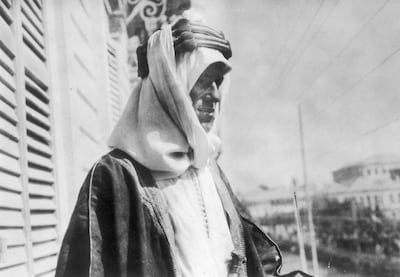As the orchestral overture fades in the opening scenes of David Lean's 1962 cinematic masterpiece Lawrence of Arabia, the next sound that the audience hears is the deep throttle of the hero's motorcycle.
Moments later, Peter O’Toole, whose portrayal of the legendary British army officer would forever leave its mark on the world’s perception of Colonel T.E. Lawrence, is seen speeding through the English countryside on a Brough Superior SS100.
It is the beginning of the film but depicts the end of the real Lawrence, killed while swerving to avoid two school boys cycling on a lane in Dorset.
The meagre circumstance of his death in a traffic accident seems impossible given the many audacious episodes in his life, including renowned roles in the Arab Revolt and the Sinai and Palestine Campaign against the Ottoman Empire in the First World War.
Such a prosaic denouement for a story that was writ large across the deserts of Arabia and the annals of history perhaps explains why, 85 years later, conspiracy theories of an assassination persist.
It is this world, of Nazi infiltration and a British Secret Service cover-up, that the director of a new film, Lawrence: After Arabia, attempts to lift the lid on. Though Mark Griffin's version and David Lean's classic share the same titular hero, comparisons between the two films are not always easy.
The 1962 epic won seven Academy Awards and is sometimes referred to as the greatest film of all time. Mr Griffin's dramatic feature, with Tom Barber Duffy in the lead role, has won some awards at small international film festivals but he has modest ambitions for its future.
He hopes to show special screenings across Dorset and the UK after its release on Tuesday was cancelled due to the coronavirus outbreak. Plans for a theatrical release in the UAE are also in the early stages.
The undertaking, Mr Griffin told The National, was a "labour of love" and the culmination of a lifetime obsession with the events that led up to Lawrence's death at the age of 46 on May 19, 1935.
“The more I looked at it, the more I felt there is every possibility that the accident wasn't an accident,” he said.
Planning to meet Hitler?
History and the official record of events are not on Mr Griffin’s side. The coronial inquest into Lawrence’s death confirmed that he had died in a road accident. It had been raining heavily on the day he crashed his motorcycle, and a dip in the road obscured the two boys, Albert Hargreaves and Frank Fletcher, from Lawrence’s view.

Despite the findings of the coroner, Mr Griffin believes it more likely that Lawrence was assassinated by secret agents as powerful government forces attempted to thwart a plan by former secretary of state for war Winston Churchill to place him at the top of the UK’s intelligence services.
The possibility that Lawrence was simultaneously manoeuvring to infiltrate the German Nazi party and planning a secret meeting with Adolf Hitler is also thrown into the mix.
The director of Lawrence: After Arabia draws comparisons between his own film and Oliver Stone's controversial 1991 political thriller JFK, which contends that US President John F. Kennedy was assassinated as part of a government plot.
Mr Griffin, though, rejects any contentions that he is dealing in conspiracy theories. “There are two words that get thrown out a lot of the time, that is: 'conspiracy theory’,” he said. “And, to me, conspiracy theory doesn't mean anything. It is subjective.”
However, the family of one of the two boys involved in the crash has spoken out against the film. In an interview with a local Dorset newspaper, Dennis Fletcher, whose older brother survived the 1935 incident, complained that conspiracy theories had dogged Frank all his life.

"It's been going on too long, what more do they want?" Mr Fletcher said in The Bournemouth Echo. "They're still trying to say he was murdered or whatever, but it just didn't happen that way.
“My family has lived with it,” he said. “I was only three-and-a-half years old at the time of the crash, but it’s still going on now.”
Mr Griffin said he wasn’t trying to rile the Fletcher or Hargreaves families, saying that the two boys had simply been “in the wrong place at the wrong time”. He does, however, think it was possible that the pair were coached to omit any reference to a black car that was spotted at the scene of the accident.
The film largely hinges on the sighting of the mystery automobile, which Mr Griffin claims deliberately collided with Lawrence’s motorcycle. He places great stock in evidence from Corporal Ernest Catchpole who said that he saw it just before the crash. The Royal Ordnance Corps officer was the first to arrive at the scene after the accident that would ultimately claim Lawrence’s life.
Much of the thinking behind the narrative is laid out at the film’s conclusion by the picture’s highest-billing participant, the Emmy-award-winning Scottish actor Brian Cox as Lawrence’s father, Thomas Chapman, and narrator.
The star of Braveheart and the Jason Bourne films recorded the voiceover in London during time off from shooting the hit HBO show Succession. Cox's wife, the German actor Nicole Ansari, plays Lawrence's mother, Sarah.
As the film draws to a close with archive footage of Lawrence’s funeral, Cox says: “History teaches us to seek the truth by viewing the events of the past through the optics of the present.”
Mr Griffin sees his film as working to that end, asking questions of an established narrative. He has struggled for years over what he views as the truth behind Lawrence’s murder.
“I think it is important that we do this. We can always look at the past through the optics of the present,” he said, “and it is crucial so that we learn from the mistakes.”


